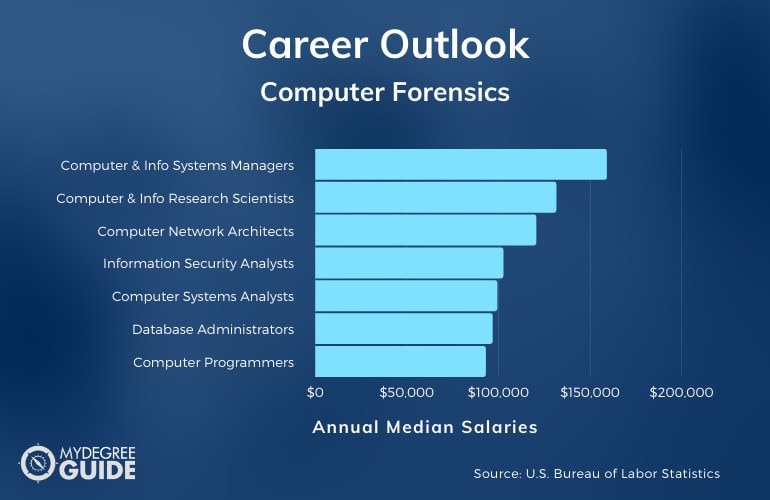If you have sharp analytical skills and enjoy the challenge of solving a mystery, you might be interested in pursuing an online computer forensics degree.

Experts in computer forensics dedicate their careers to recovering and collecting digital evidence associated with both traditional crimes and cybercrimes.
Editorial Listing ShortCode:
People in this field typically gather and analyze computer data from all kinds of computer devices, including mobile phones as well as personal computers. They then use that data to help investigate criminal activity.
Universities Offering Online Bachelors in Computer Forensics Degree Program
Methodology: The following school list is in alphabetical order. To be included, a college or university must be regionally accredited and offer degree programs online or in a hybrid format.
Bay Path University
Bay Path University offers a BS in Cybersecurity: Digital Forensics and Incident Response. The NSA has designated Bay Path as a National Center of Academic Excellence in Cyber Defense. The program’s curriculum covers how to investigate white collar crimes, handle evidence, and identify malware and other digital threats.
Bay Path University is accredited by the New England Commission of Higher Education.
Capella University
Capella University offers an online BS in Information Technology with a specialization in Information Assurance and Cybersecurity. Students in the program are given opportunities to earn professional certifications from CompTIA, SAS, and Cisco. The curriculum includes labs and simulations of real-world scenarios. Coursework includes Computer Forensics, Security Management and Policies, and Cyber Attacks and Ethical Hacking.
Capella University is accredited by the Higher Learning Commission.
Colorado Technical University
Colorado Technical University offers an online program for a Bachelor of Science in Computer Science – Cybersecurity Engineering. Students can take CTU Fast Track exams to earn credit for the knowledge they already have. Coursework includes Problem Solving in Computer Science, Linux Programming, Fundamentals of Networking, Ethical Hacking, and more.
Colorado Technical University is accredited by the Higher Learning Commission.
Davenport University
Davenport University’s BS in Cyber Defense can be earned entirely online. The curriculum emphasizes hands-on, experiential learning and preparation for professional certification exams, including the Certified Information Systems Security Professional exam. The full degree program is also available on campus, and students may take a combination of online and on-campus classes if desired.
Davenport University is accredited by the Higher Learning Commission.
Drexel University
Drexel University offers an online program for a BS in Computing and Security Technology with concentrations in Computing Technology and Computing Security. The program provides flexible scheduling options and allows students to work at their own pace. Graduates typically pursue careers in IT, system administration, computer forensics, and related fields.
Drexel University is accredited by the Middle States Commission on Higher Education.
Grand Canyon University
Grand Canyon University’s Bachelor of Science in Cybersecurity program is available both online and on campus. Online classes are just 7 weeks long. Courses include Cyber Forensic Investigations, Cyberlaw and Privacy in a Digital Age, Security Driven Systems Administration, and more.
Grand Canyon University is accredited by the Higher Learning Commission.
Maryville University
Maryville University’s Bachelor of Science in Cybersecurity program is available 100% online. Students can potentially finish in just 2.5 years. There are three tracks available within the program: Offensive, Defensive, and General. Graduates have gone on to become information security analysts, network architects, and security engineers.
Maryville University is accredited by the Higher Learning Commission.
Norwich University
Norwich University offers an online program for a Bachelor of Science in Cybersecurity. Students in the program may pursue a concentration in Computer Forensics and Vulnerability Management or Information Warfare and Security Management. Norwich offers many elective options so students can customize their education. Online classes provide scheduling flexibility, and there are multiple start dates each year.
Norwich University is accredited by the New England Commission of Higher Education.
Old Dominion University
Old Dominion University offers a Bachelor of Science in Interdisciplinary Studies with a major in Cybercrime that can be earned online. The curriculum blends the study of traditional criminal justice with technology. Students in the program have the option to participate in internships. ODU’s online courses may be synchronous or asynchronous.
Old Dominion University is accredited by the Southern Association of Colleges and Schools Commission on Colleges.
Pennsylvania State University
Pennsylvania State University offers a Bachelor of Science in Security and Risk Analysis – Information and Cyber Security. Graduates of the program often become computer forensics specialists, network security specialists, or computer system auditors. Penn State’s online classes teach all the same materials as on-campus classes.
The Pennsylvania State University is accredited by the Middle States Commission on Higher Education.
Purdue University
Purdue University offers an online program for a BS in Information Technology. Courses are 10 weeks long, and most students dedicate 15 to 18 hours per week to their studies. There are 6 different concentrations to choose from. These are Information Security and Assurance, Network Administration, IT Management, Programming and Software Development, Supply Chain Management and Logistics, or Game Development.
Purdue University is accredited by The Higher Learning Commission of the North Central Association of Colleges and Schools.
Saint Leo University
Saint Leo University offers an online program for a Bachelor of Science in Cyber Security. The curriculum includes courses such as Principles of Cyber Security, Computer Forensics, Network Defense, System Security, and Internet and Intranet Security. Internship opportunities and virtual labs are available to help students develop real-world problem-solving skills. The full degree program is also available on campus.
Saint Leo University is accredited by the Southern Association of Colleges and Schools Commission on Colleges.
Southern New Hampshire University
Southern New Hampshire University offers a Bachelor of Science in Criminal Justice. A Cybercrime concentration is available for students who are specifically interested in learning how criminal justice is applied in the digital world. SNHU’s online classes have no set meeting times, and students can complete coursework from any place with an internet connection.
SNHU is accredited by the New England Commission of Higher Education.
Tiffin University
Tiffin University offers a Bachelor of Criminal Justice in Digital Forensics. Tiffin has been designated as a National Center of Academic Excellence in Cyber Defense Education by the NSA. Courses are taught by professors with real-world experience in law enforcement and related fields. Students in the program are also given opportunities to intern at professional agencies.
Tiffin University is accredited by the Higher Learning Commission.
University of Saint Mary
The University of Saint Mary offers an online program for a Bachelor of Science in Cybersecurity. The curriculum covers technical skills, such as database design and computer networking. Courses include Operating Systems and Security, Computer Forensics, Cryptography, Website Design and Digital Marketing, and more. Students are also required to complete an internship worth 3 credits.
The University of Saint Mary is accredited by the Higher Learning Commission.
University of Texas – San Antonio
The University of Texas—San Antonio offers a Bachelor of Business Administration in Cyber Security. The degree can be earned 100% online. Courses include Database Management for Information Systems, Network Security, Operating Systems Security, Introduction to Telecommunications for Business, and more.
The University of Texas at San Antonio is accredited by the Southern Association of Colleges and Schools Commission on Colleges.
University of the Potomac
The University of the Potomac offers a Bachelor of Science in Cybersecurity. Classes are conveniently available both online and on campus. The curriculum includes management courses, such as Foundations of Business, and computing courses, such as Network Security Management and Cyber Law.
The University of the Potomac is accredited by the Middle States Commission on Higher Education.
Walsh University
Walsh University’s online BS in Cybersecurity program aims to help students develop advanced technological skills. The program includes stackable certificates, and students can start by earning just one certificate before deciding whether to complete the full bachelor’s program. Multiple start dates are available each year.
Walsh is accredited by the Higher Learning Commission.
Western Governors University
Western Governors University offers an online program for a Bachelor of Science in Cybersecurity and Information Assurance. Students in the program are provided with opportunities to earn a variety of professional certifications before they graduate. Coursework includes Digital Forensics in Cybersecurity, Cyber Defense and Countermeasures, Legal Issues in Information Security, and more.
Western Governors University is accredited by the Northwest Commission on Colleges and Universities.
Wilmington University
Wilmington University offers a Bachelor of Science in Cybersecurity. The program aims to prepare students for industry certifications, such as Certified Information Systems Security Professional, Certified Information System Auditor, Linux+, and more. The curriculum emphasizes experiential learning and provides students with opportunities to participate in internships and co-ops.
Wilmington University is accredited by the Middle States Commission on Higher Education.
Online Computer Forensics Degrees

As a computer forensics major, you’ll typically take classes that teach you how to examine electronic devices for evidence of cybercrime. You can also learn how to analyze the data and present it for prosecution in a court of law.
Some computer forensics experts focus more heavily on using cybersecurity technology to prevent cybercrimes in industrial technology. Depending on the classes you take, obtaining a cyber forensics degree may help you qualify for opportunities in a variety of cybernetic careers.
Some professionals become IT managers or information security analysts. Forensic computer examiners commonly work with law enforcement.
Here are some of the subjects you can learn about through a computer forensics online degree program:
- Computer operating systems
- Digital storage devices
- Programming languages
- Forensic analysis
- Database design
- Cybercrime
- Cyberlaw
- Network security
- Computer ethics
Depending on your educational institution, you may complete your online bachelors in computer forensics as an individual student or as a member of a cohort. As a cohort member, you could benefit from interaction with fellow students, but the degree plan may take longer to complete.
Computer and Cyber Forensics Careers & Salaries

If you pursue a bachelor’s degree in computer forensics, you’ll learn how to analyze digital data. Graduates often utilize their training to identify cybersecurity breeches or help solve crimes.
If you end up investigating criminal activity for law encorcement, you may be called upon frequently to testify in court about the evidence you have gathered and analyzed. Computer forensics experts can also work for national law enforcement agencies such as Homeland Security and the FBI. State and larger municipal organizations also employ computer forensic experts to safeguard important public information.
According to the Bureau of Labor Statistics, here are some of the possible career paths associated with the study of computer forensics.
| Careers | Annual Median Salaries |
| Computer and Information Systems Managers | $159,010 |
| Computer and Information Research Scientists | $131,490 |
| Computer Network Architects | $120,520 |
| Information Security Analysts | $102,600 |
| Computer Systems Analysts | $99,270 |
| Database Administrators | $96,710 |
| Computer Programmers | $93,000 |
| Network and Computer Systems Administrators | $80,600 |
| Forensic Science Technicians | $61,930 |
| Private Detectives and Investigators | $59,380 |
Law firms, banks, medical laboratories, and accounting firms are among the many other types of organizations that employ computer forensic teams.
Research positions, such as computer and information research scientists, typically require a masters degree. A bachelors in computer forensics can act as a solid foundation for further studies. While management positions do not necessarily require a graduate degree, extensive experience is often preferred for leadership roles.
Computer Forensics Bachelor’s Curriculum & Courses

A typical computer forensics and digital investigation curriculum will help you develop several fundamental skill sets that are essential for a computer forensics expert to master.
Here are some of the courses you may take while earning your cyber forensics degree:
- Criminal Procedure: This course covers the procedures required to indict and prosecute criminal suspects in a court of law.
- Networking Fundamentals: This class covers the technological advances involved in creating a computer network.
- Law of Searching and Seizing Digital Evidence: This class covers the procedures required to procure digital evidence that is acceptable in court.
- Criminal Investigation: In this class, you’ll learn about investigating crime scenes, writing reports, collecting evidence, and preparing for trial.
- Digital Forensic Investigation Techniques: You’ll learn about the latest software technologies involved in computer investigations.
- Malware Forensics: This class involves detecting and analyzing computer viruses.
- Digital Forensic Analysis: In this class, you’ll learn how to examine and process digital evidence.
- Anti–Forensics and Network Forensics: In this course, you’ll learn how cyberterrorists hide hidden messages and files in computer systems.
- White Collar Crime: This course teaches you about white-collar crimes, including fraud, abuse of power, and environmental crimes.
- File Forensics: This class tells you more about cryptographic hash verification and other techniques of digital retrieval.
Computer forensics experts know how to extract data from computers, analyze that data for clues on criminal activity, and create effective presentations on evidence for use in the courtroom. At the same time, they must maintain a strict code of professional ethics.
A computer forensic bachelors degree program can help you develop essential knowledge and skills sets for this field.
Admissions Requirements

Each university has its own admission requirements for applicants, but here are some of the most common:
- SAT or ACT scores (only some schools require them)
- High school diploma or GED equivalent
- Official transcripts
Some schools require applicants to pay a fee in order to apply. Most colleges or universities also prefer a minimum high school GPA, but that minimum can vary from school to school. You can contact your prospective school’s admissions office or visit their website for their specific criteria.
Online Computer Forensics Programs Accreditation

Many employers prefer to hire new employees who have graduated from a digital investigation program that is accredited, which is a mark of credibility. Regionally accredited schools have been thoroughly evaluated for the quality of their educational offerings, faculty, and student services.
Accredited universities are more likely to include the most recent technological advances in their computer forensics curriculum. In addition, your credits are more likely to transfer to another school or degree program if they’re earned at an accredited institution.
Financial Aid and Scholarships

A university education can be costly, here are common types of funding assistance for qualifying students:
- Grants. Federal grants are generally awarded based on financial need.
- Scholarships. Scholarships are typically awarded for either merit or financial need.
- Work-study programs. These programs can help connect you with a part-time job at your school or a local business.
- Student loans. These federal loans must be paid back once your college degree is completed, but they often have a lower interest rate than other loan options.
It’s necessary to fill out the Free Application for Federal Student Aid (FAFSA) to determine your eligibility for federal aid and other forms of need-based aid.
What Can You Do with a Computer Forensics Degree

After completing a computer forensics online degree, some graduates find work detecting and solving computer crimes for a government agency, private business, or law enforcement institution. Computer forensics technicians and digital forensics analysts can collect digital evidence for traditional crimes as well.
Those who are interested in decoding may pursue a career as a cryptanalyst. Computer forensic professionals can also go into the information security sector. They might work as information security analysts, cybersecurity engineers, or security consultants.
How Long Does It Take to Get a Computer Forensics Bachelor’s Degree Online?

Students can typically complete a digital forensics degree online in 4 years with full-time study. Most bachelor degree programs require the completion of 120 credit hours, and a traditional semester lasts 16 weeks.
Some online programs, though, consist of shorter terms, with classes lasting 6 weeks or 8 weeks. If you follow this academic schedule full-time and take on summer classes, you may be able to complete your degree in less time. Attending school part-time will likely add to your time to completion.
What’s the Difference Between a Bachelor Degree in Computer Forensics vs. Cyber Security?
Computer forensics and cyber security approach cyber crimes from different perspectives.
| Computer Forensics | Cyber Security |
|
|
Cyber security professionals aim to protect individuals and businesses from online criminal behavior. On the other side of things, computer forensics experts often work in response to a cyber crime, recovering data or collecting digital evidence.
Is an Online Computer Forensics Degree Worth It?

Yes, an online computer forensics degree is worth it for many professionals. As incidents of computer fraud and cybercrime increase, the demand for computer forensic experts is also growing.
According to the Bureau of Labor Statistics, information security analysts are projected to see 33% job growth over the next ten years, which is much faster than the average for all occupations. Employment for forensic science technicians, which includes computer forensics examiners, is expected to grow 16% over the same period. Computer forensics experts are needed in both public and private sectors.
Getting Your Bachelors in Computer Forensics Degree Online

Do you like solving problems and bringing wrongdoers to justice? Do you enjoy the challenge of highly analytical, detailed work? If you want to work with computers and law enforcement at the same time, you might consider attending one of the many computer forensics schools online.
Computer forensics professionals may also choose to enter the information security space—providing cybersecurity protection for governments, businesses, medical facilities, and other organizations. This lucrative field is in high demand, and earning a credible online forensic science degree from an accredited school could allow you to qualify for a range of opportunities.
The sooner you start exploring available bachelors degrees in computer forensics, the sooner you may find the program that best fits your personal needs and professional goals.
